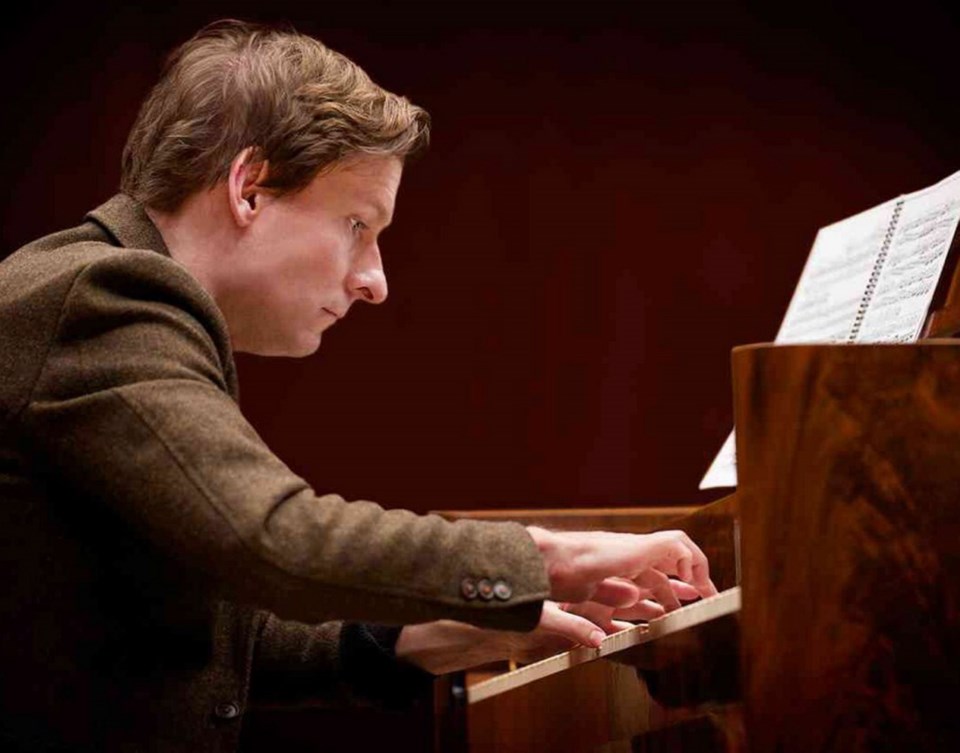What: Early Music Society of the Islands: Kristian Bezuidenhout, fortepiano
When/where: Saturday, 8 p.m., Oak Bay United Church (1355 Mitchell St.); pre-concert talk at 7:10.
Tickets: $30, seniors and students $24, members $22. Call 250-386-6121; online at rmts.bc.ca; in person at the RMTS box office, Ivy’s Bookshop, Munro’s Books, and Long and McQuade.
On Saturday, the brilliant and acclaimed fortepianist Kristian Bezuidenhout will make his Victoria debut, in an all-Mozart program sponsored by the Early Music Society of the Islands.
Born in South Africa in 1979, Bezuidenhout studied in Australia and at the Eastman School of Music, in Rochester, New York (his teachers included the renowned fortepianist Malcolm Bilson). He now lives in London.
His program for Saturday, nicely varied and spanning almost 15 years of Mozart's short life, is bookended by sonatas: K. 282, in E-flat major, and the popular K. 331, in A major, the one that begins with the gorgeous variation set and ends with the witty “Turkish rondo” beloved (and massacred) by piano students everywhere. In between are a minuet, a gigue, the rarely played K. 399 suite, and two of Mozart's greatest piano works: the Rondo in A Minor, K. 511, and the Fantasia in C Minor, K. 475.
Bezuidenhout knows this music well. Since 2010, he has released seven CDs devoted to Mozart's solo-piano works, on the Harmonia Mundi label. (He has recorded other works by Mozart, too, as well as Beethoven, Schubert, Mendelssohn, and Schumann, for various labels.)
Bezuidenhout’s Mozart is passionately alive, full of infectious energy, and great fun. It is also educational, in the best sense of the word — a revelation. He makes us hear Mozart with new ears, makes even familiar, canonical works sound fresh.
His secret is that he takes seriously the historical evidence about 18th-century performance practices and Mozart’s own keyboard performances.
But isn’t that the sort of thing early-music types always do? In theory, yes. In practice, not always, especially when it comes to embellishment and improvisation. We know, from various kinds of evidence, that Mozart performed his piano music with considerable spontaneity and creative licence, his “public” concertos as well as his more “private” solo works. Yet, few modern pianists, even the historically informed fortepianists, really take this evidence to heart, because it conflicts with their ingrained reverence for a composer’s score.
Today every classical musician grows up being taught to worship and obey the score, as though it were a holy relic — and the greater the composer, the holier the relic. Some performers go as far as refusing, knowingly, to correct errors and gaps in a score, as though even a composer’s slips of the pen were holy.
Bezuidenhout throws off the oppressive shackles of such literalistic thinking, gets up off his knees, and takes Mozart the performer at his word. He embellishes Mozart’s music freely and generously, often surprisingly, even playfully, though always in an appropriate 18th-century style. And his embellishing appears spontaneous, suggesting that even listeners familiar with his recordings will hear new things when he performs in concert.
Moreover, Bezuidenhout is no less free when it comes to expression, introducing plentiful nuances of tempo, dynamics, phrasing and texture. Here, too, he violates a taboo; few modern pianists dare to play Mozart with this much Romantic flexibility and fervour.
(For a lesson in what extraordinary fruits a Romantic approach to Mozart can yield, run, don’t walk, to YouTube and listen to Rachmaninoff’s 1919 recording of the first movement of K. 331. It’s glorious, though you’d be rapped on the knuckles with a very large ruler if you proposed such an interpretation to a piano teacher today.)
If you prefer your Mozart pious and dull, best to stay home with your Richter and Brendel and Uchida CDs. But if you are open-minded and curious, whether a standard-repertoire fan or an early-music aficionado, Bezuidenhout’s appearance promises to be one of the concerts of the year.
He will be playing, incidentally, a locally owned fortepiano built in 1996 but modelled on an instrument in the Smithsonian Institution that was made in Munich around 1795.
And note: Saturday’s concert will be in Oak Bay United Church, not Alix Goolden Hall, EMSI’s usual venue. The more intimate church setting will certainly flatter both instrument and performer, but at a cost — only 240 tickets are available for this concert.
